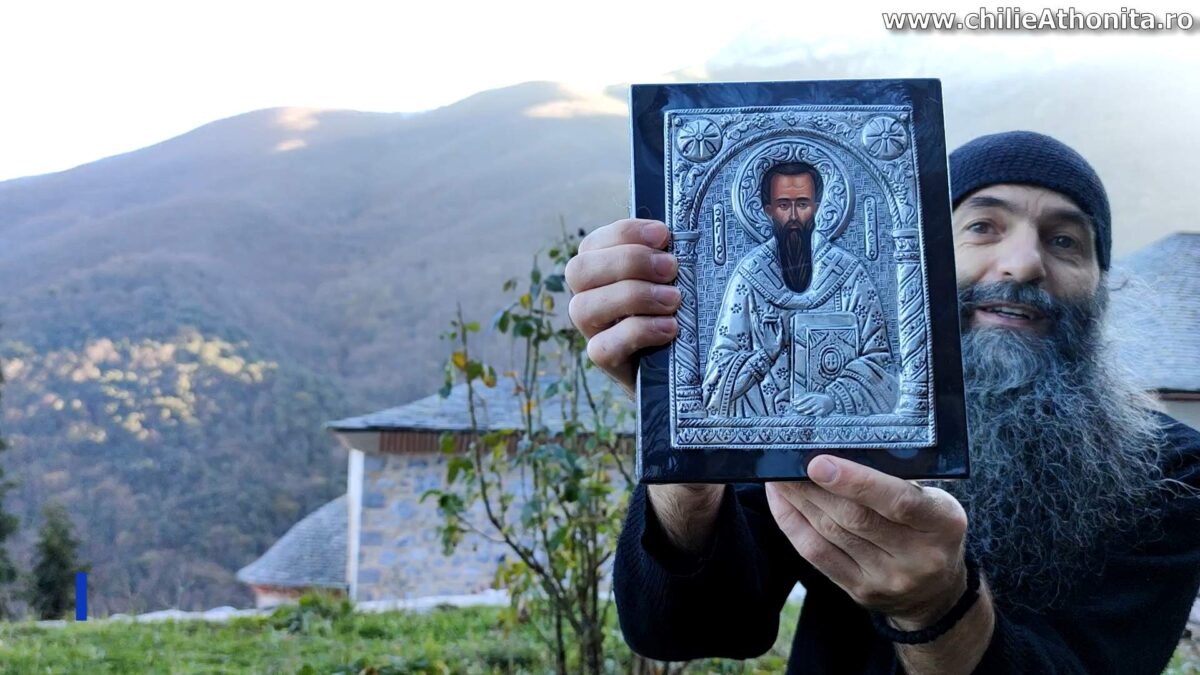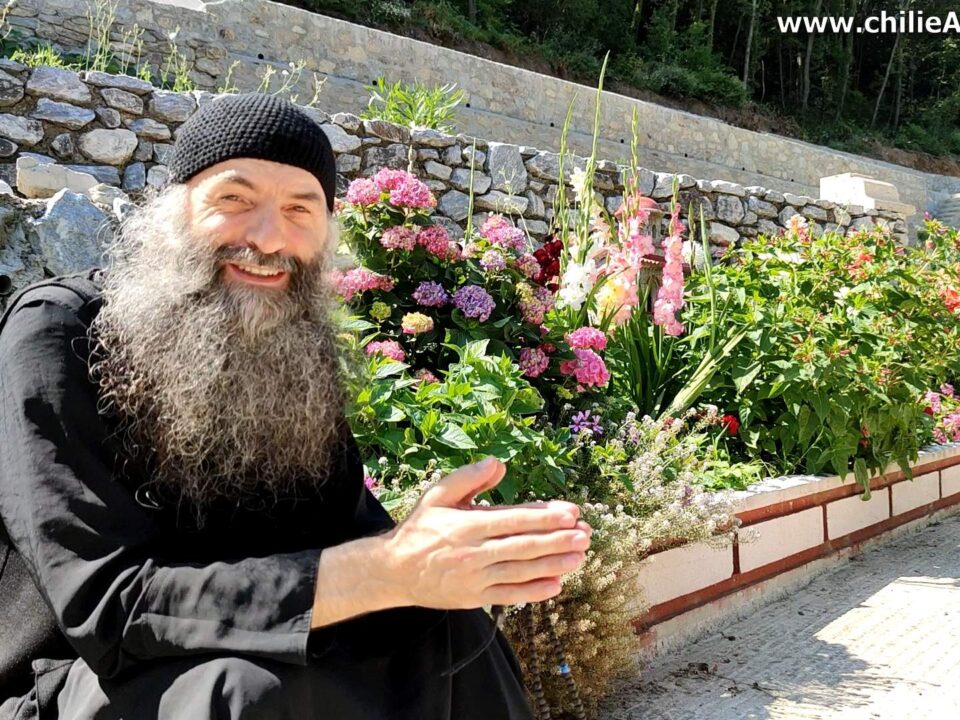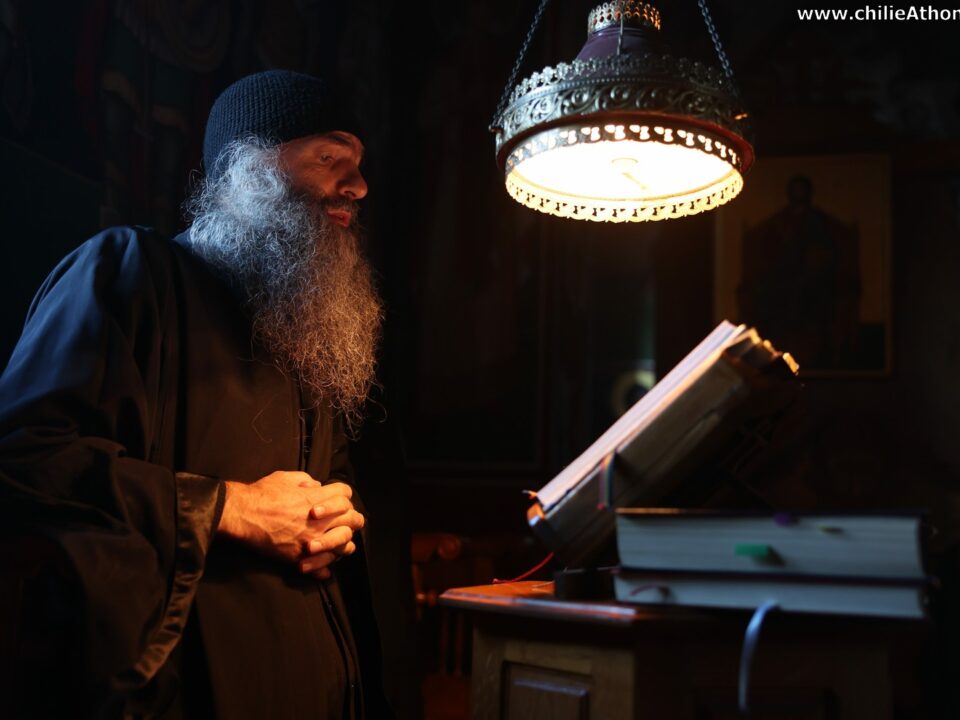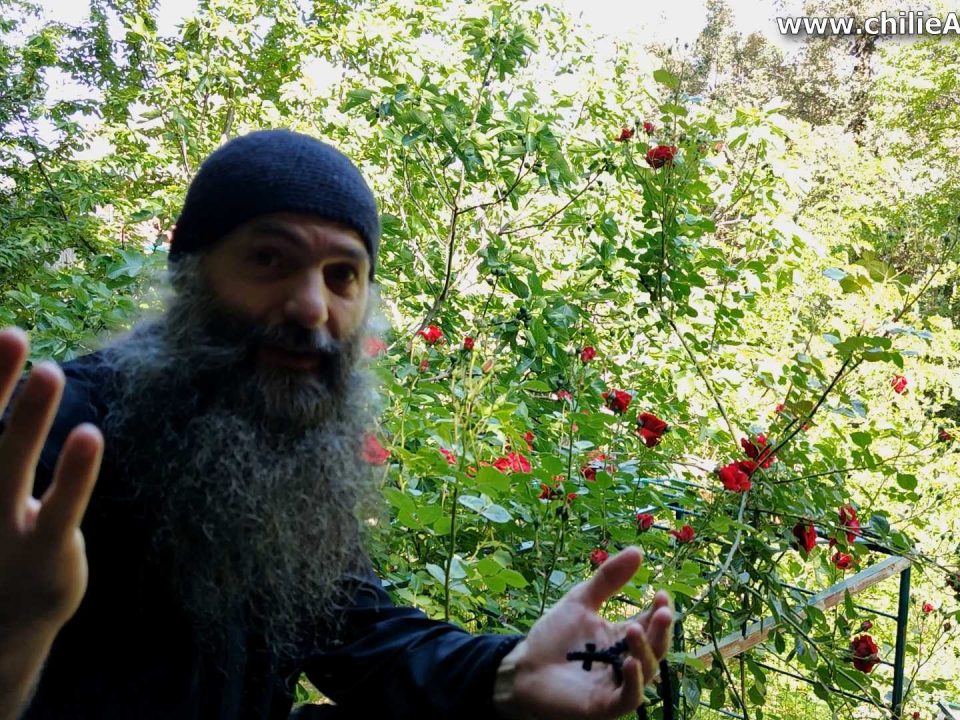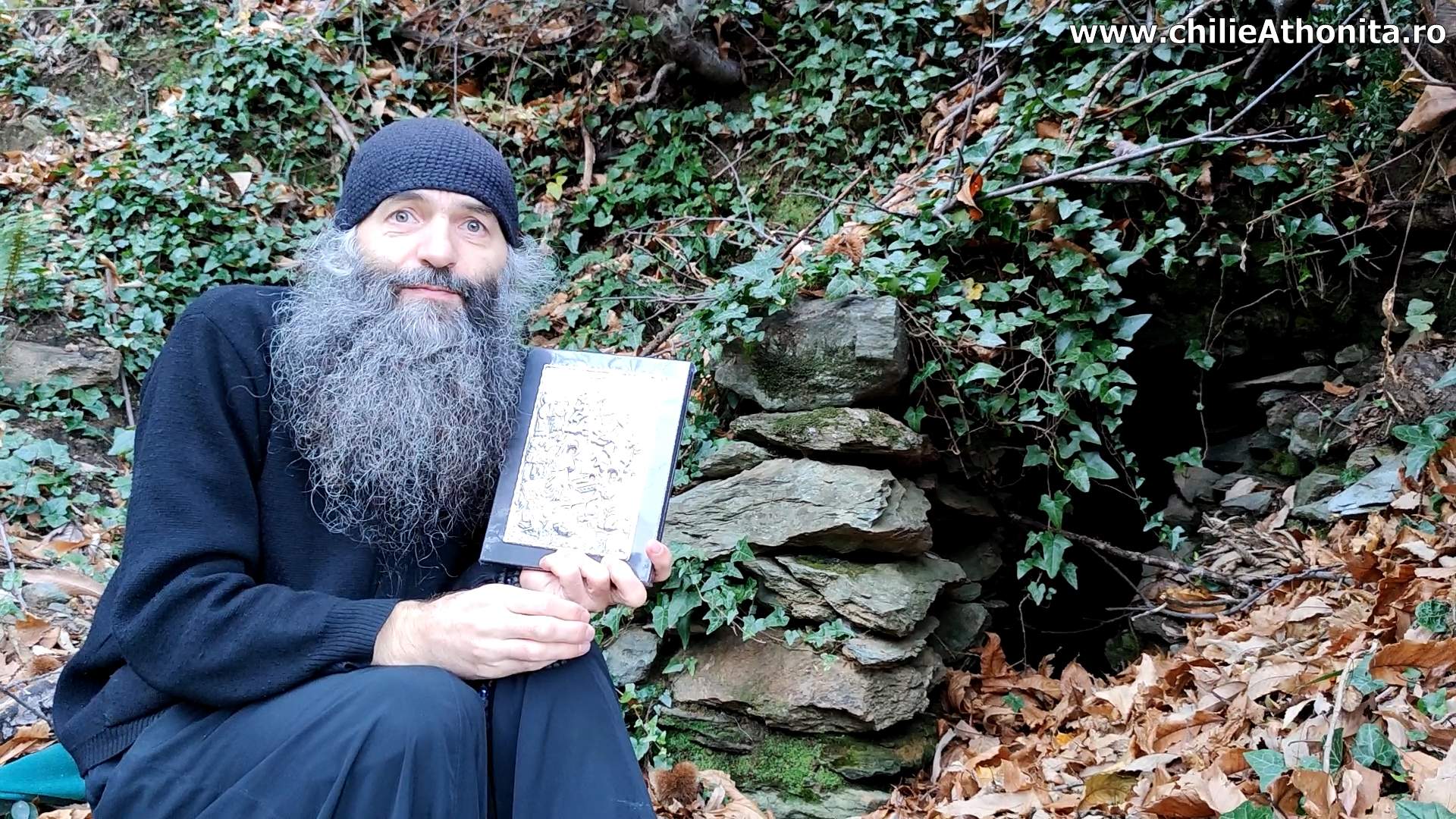
Christmas, the Mother of God and St. Stephen – Father Pimen Vlad
22 December 2022
This Is Romania! – Athos, Between Men and Saints! | Complete Edition – Kanal D
1 January 2023Many know that St. Basil is one of the greatest saints of the Church, but fewer of us know that the entire family of St. Basil was a family of saints.
Listen to Father Pimen Vlad as he tells us the life of Saint Basil.
Enjoy!
Here we are again, my dears! It’s a little cooler now, we’re in December. We also have, if you see remoteness, a bit of snow on the top of Aton. So slowly it’s going to come down to the valley. The video has been filmed a few days before you see it and I hope that on January 1st we will have snow here as well. Dear ones, I want to talk to you today about a great saint. But right now, as I was talking to you, I remembered a nice quote, which I read somewhere: “What is bad? Evil is the lack of good, for where good is, evil no longer takes place.” It is the same with light and darkness. Darkness exists until the light comes. Just like in a room it’s dark until you turn on the light bulb. Or it’s like saying, “What is darkness?” — It’s the lack of light. “What is evil?” is the lack of good, you understand?
So let’s try to do good all the time in our lives, and then evil will disappear. Just as Saint Porphyrios the Kavsokalivite said very beautifully: “Do not speak ill, do not deal with evil, and then evil will disappear from your life. Try to speak well, about beautiful things, do good things, beautiful things, and then you will have them in your life.” Yes, my dears! And in order not to get too long, because there is much to say, I will tell you about St. Basil the Great. Have you heard what name he was given? “The Great”!
In history, if we look at certain people, there are few who got this name in ancient times. It is, for example, Alexander of Macedonia or Alexander the Great, among worldly people, so to speak, who managed to conquer almost half the world. That is, he did something in his life out of normal. Who else got that name? Stephen the Great, who was actually not so big, was under one meter seventy. And he took the name “the Great”, that is, great at heart, great man who sacrificed himself for the country, fought for it. He maintained a balance in the center of Europe, he stood up there, so that nothing would cross and come across the rest of Europe.
All the peoples of Europe should have been grateful to Saint Stephen the Great and, of course, to the Romanian people. This voivode at that time helped so that Europe wouldn’t be a Turkish province. He maintained a balance and took the name “the Great” and was recognized by everyone. In St. Basil the Great, the name “the Great” was given not in consideration of his stature, but of his deeds, deeds that made him great.
His father’s name was Basil, and his mother’s name was Emilia. So there were four brothers and a sister, and think about it, dad, mother, four brothers and a sister, they all became saints on the calendar. Do you realize what a blessed family that was? His brother Peter became bishop in Sevastia. Then another brother, Gregory, Bishop of Nyssa. And they had another brother, Naucratius, who became a hermit, a great wonderworker. Their sister, Macrina, who also led a pure life, came to work miracles during her lifetime and is also listed on the calendar among the saints. Do you see what a blessed family? But it is said that greater than all in spiritual measure was Saint Basil. And he was not only a spiritual man, he was also a great philosopher.
He studied at first in Byzantium, in Constantinople, and then came to Athens, where there was the crème, as they say, the greatest philosophers. There he met St. Gregory the Theologian. The two had a spiritual friendship. They had the same permanent conduct in prayer, and had decided to eat nothing but bread and greens. This way they led a hermit life from their youth, were very pure of heart, and avoided any contact that was not good. It is said that around the same time Julian the Apostate, who later became emperor and persecutor, studied there. After his studies, it is said that St. Basil met a great philosopher of those times, Eubu. And speaking with Saint Basil, [the saint] convinced him too, that is, he helped him understand what the Christian faith meant, and then he said: “Holy Father, I leave all philosophy, take me with you.” And they went together to Jerusalem, where they prayed at the Holy Places, and went to the bishop. At that time there was a custom, some people were baptized much later, some of them considering people should be of an appropriate age [for baptism]. Then Saint Basil together with this philosopher asked the bishop to baptize them. When the bishop saw their spiritual zeal, he led them to the Jordan to baptize them.
It is said that St. Basil prayed: “Lord, give a sign that my faith is accepted with you!” and at the moment when the bishop entered the Jordan with them, there came like lightning from heaven above them, and out of the lightning came a white dove that sank into the Jordan. This was the sign from God for his faith and zeal. After baptism they passed through Antioch, and from there, by the word of God, they returned to their homeland, Caesarea, because St. Basil is from Caesarea — Cappadocia. A lot of great saints are from there. Before they arrived in Antioch, an angel appeared to the bishop in those places who told him that two strangers would come the next morning and they should be welcomed well. The angel also showed her their face.
He sent men to the gate of the city in the morning to meet them and bring them to himself. When he saw them, the bishop recognized them immediately. Conversing with them and seeing their zeal, he ordained St. Basil deacon. From here they took the road to Cappadocia where he was made a priest. Seeing that the world wanted to make him bishop, he withdrew into the wilderness with St. Gregory where they spent several years in asceticism and prayer. After a while he confronted the heresy of the Arians within the church. Then, Saint Basil being called, returned to Cappadocia and agreed to be made bishop to defend the church. Saint Gregory joined him at the bishopric to help him.
It is said that Julian the Apostate came once, it was still during his reign, while he was emperor. Saint Basil, knowing him, received him with bread and salt, as was the custom. But the king said: “Welcome me with the same food you eat!” St. Basil brought black bread, since this was what he was eating. But the king commanded to give those loaves to the animals and send hay back to the saint. When he received the hay, Saint Basil said: “It is clear that we gave the king of the food that we eat, and he gave us of the food that he eats.” Angry, the emperor began to threaten him that, once he returns from the battle against the Persians, he would burn the church and the fortress and kill them all.
Saint Basil gathered all the citizens and told them what the emperor had said, he asked them to collect all the gold they had, knowing that Julian the Apostate loved riches very much and would take that and leave the people alone. Each man brought gold, diamonds, precious stones, what they had, and St. Basil gathered them and prepared them in bundles and put them in the pantry they had at the bishopric, with the name of each one written on it. Then he called everyone in the city to pray. They climbed the mountain and began to ask God to have mercy on them. At one point Saint Basil saw the Mother of God as an Empress, with a host of angels which she sent to bring the Holy Great Martyr Mercurius to Her.
When he came, the Mother of God sent him to kill Julian the Apostate, so as not to upset Basil, bishop of Caesarea. Seeing this, Saint Basil returned to the fortress, to the church, where the relics of Saint Mercurius were. And when he was praying there before the relics, he saw Saint Mercurius in the icon that he had disappeared and shortly after he returned and had the bloody spear. And then immediately he sent to call the people who were on the mountain, to all descend and bring glory to God, the Mother of God and Saint Mercurius, for having saved them from the danger that was coming. Then he called upon the people to take back their gold, diamonds and what they had given, but they said that if they were ready to give them to the earthly emperor, much more would they give them to the Heavenly King and let the saint make houses for the poor, or whatever else.
But St. Basil did not agree to keep everything and gave back three parts to the people, he kept only one to distribute to the poor or for hospitals, as was his custom. Saint Basil had begun to make hospitals, nursing homes, and all kinds of such settlements. He was, we could always say, the first founder of such places for the poor, for the sick, which were very well organized. And when Julian the Apostate died, Valens came to reign, he who followed Arius’s heresy and persecuted the church, and he did many misdeeds to Saint Basil.
I also remember a miracle with someone from a good family who was very faithful. He had a daughter whom he had raised according to God, and he thought of taking her to Jerusalem, to a nunnery, to entrust her to the Lord. But a servant of his fell in love with the girl and wanted her, but he knew he had no chance, and then he went to a great wizard and promised to give her anything if he got the girl. The magician explained that this was not in his power and sent him to the great devil — to go to a cemetery at midnight to ask for his help. The devil told him that he could help him, but only after he wrote that he was denying Christ.
After the servant accepted and denied Christ, faith, everything, the devil made the girl fall in love with him so much that she wanted to give up going to the monastery to take him as her husband. Seeing that he had no choice, the father called his servant and gave him money and married the two. After a while, our man died, the couple were going about their lives, but the people around them began to ask the woman why her husband never goes to church. Then he tried to lie that he was going to another church. But his wife told him to go to church to see him receive Communion. Seeing that he had no choice, he told her the whole thing.
Then his wife began to weep that she disobeyed her parents and that she married a servant who had given himself to the devil. And then she went weeping to Saint Basil and asked for his help. The saint told her to come with her husband, and when he heard the whole story from her, he locked him in a room and prayed. After a few days, the saint asked the man how he felt. The man replied, “Bad, because the devils always come and fight because I went to them and asked for their help and they say that now I want to deny them.” When the saint heard this, he prayed again. A few days later, he asked the man how he felt. He replied, “I hear the devils further, they cannot come near me.”
After the other days of prayer, the man said: “Now I can’t hear them at all.” Then the saint said, “Good, now come to church!” In the church, the saint gathered all the people and asked them to pray for the one saved from the devils, to cry out “Lord have mercy!” for him. The man wept because the devils had with them the document by which man denied Christ and which they had threatened to show at the Judgment. The saint said, “It’s nothing, the Mother of God can solve that too!” And they went into the church, and everyone shouted, “Lord, have mercy!” And then the devil appeared, who tried to snatch the young man out of the hands of Saint Basil, who rebuked the devil: “Are you not ashamed? Your loss was not enough, now you want to bring down Christians too!?”
Then the saint asked those present to pray even more strongly and to cry out “Lord have mercy!” until the Devil fled, and in the air appeared the script written by that man and ended up in the hand of St. Basil. After he recognized his writing, Saint Basil tore the paper, burned it and told the freed man to thank the Mother of God for saving him and bringing him to the right path, and so Christ received him back. So you see, even those who have denied God, Christ receives them back if they truly repent and pray much. Do you see how much power St. Basil had?
It is also said that Valens, the emperor, tried many times to threaten St. Basil with taking away his wealth.
The saint replied, “Do you say that you are taking away my wealth? You will not be richer with it, nor will I become poor, for I have nothing. These clothes on me and some things.” Then Valens threatened to subject him to all kinds of torment, but the saint replied that he would only be getting him out of his misery (as he was already old and sick anyway) and he would get to Christ sooner.
However, St. Basil helped the emperor when his child fell ill. Seeing his son dying, Valens called St. Basil and told him that if his faith was true, he should do something and save the child. The saint prayed and the sick man was healed. The king rejoiced, but the Arians came and said that they too could have done this, and they took the prince and baptized him to their faith. But when they brought him out of the pool, after a few moments the king’s son died as to show God’s punishment, because after the saint had made him well by prayer, Valens gave him to the Arians to baptize him.
Many other miracles St. Basil also performed: there was somewhere a large church that the Arians went and forcibly took from Orthodox Christians. And then the saint went straight to the king and rebuked him for allowing it. The king gave him authority to go to judge, but not to be biased towards Christians, but to judge justly. Saint Basil went and gathered everyone, the Arians and the Christians. Then he placed a seal on the church and said that they would all pray, in turn, every three days, and to whoever the locks were broken and the church opened, let it be theirs.
The Arians liked the idea and prayed first for three days, but in vain: the church remained locked. It was the turn of the Christians who prayed for several hours. After this time, St. Basil went and blessed the doors of the church, and immediately a lightning bolt broke all the locks and the church opened. Even the emperor heard that the saint had worked justly and performed a miracle.
I will tell you only one of the many miracles performed by Saint Basil: Saint Ephrem the Syrian was in the wilderness and he also heard that St. Basil was great, and, while praying, he saw St. Basil as a pillar of fire up to heaven and a divine voice said to him: “That’s how Basil is!” Hearing this, he decided to go and see him, and left the wilderness for days on foot to reach St. Basil. It happened on a Sunday when it is a feast day and Saint Basil entered the altar with great glory, in beautiful vestments. Seeing these things, Saint Ephrem said to himself: “Is this so, is that pillar of fire in such glory, and I am torturing myself in the wilderness, and have I not reached the pillar of fire?” and he went into a corner.
Saint Basil, knowing with the gift of God that he had come to the church, sent the deacon: “Go and bring that strange monk from the side to the altar!” The deacon went, but Ephrem, who did not know the language, told him by means of interpreters that he is not calling him, because he is a stranger and cannot know him. The deacon left, but after a while he returned: “Ephrem, the bishop calls you to the altar!” When he heard that he called him by name, he said he would go after the service. Moreover, Ephraim saw that when he read the Gospel, something like fire came out of his mouth to St. Basil, and then he also realized what extent he had reached.
When they met afterwards, Saint Basil told him to bow his knees in prayer and put his hands on his head and ordained St. Ephrem deacon. Afterwards, Saint Ephrem asked Saint Basil to do something so that he could understand him without any interpreters, and when Saint Basil prayed, he put his hands on the head of St. Ephraim, and he began to speak Greek.
There are many miracles in St. Basil, but I will finish by telling you how beautifully his life ended. There was a very good Jewish doctor, a friend of St. Basil, whose name was Joseph. He had the faith of the Jews, but he respected St. Basil very much. Hearing that the saint was very sick, he came to him. He took his pulse and told him to prepare himself as he wouldn’t live by that evening and would pass. He also told the people around him to prepare the burial grounds, as the saint would leave by sunset. Basil asked the doctor what he would do if he was wrong. “Then I will die!” he replied. “It shouldn’t be you who dies, but the old man, and you shall receive the Christian baptism,” the saint asked. The doctor gave in.
Then Saint Basil prayed and said: “Lord, lengthen my life for him!” The next day when a Jew came, believing the Saint to have died, as he was a doctor with experience, he saw St. Basil telling him that he must keep his word.
“Truly, you must have died by all the laws of medicine last night,” the Jew said to him, “Your faith is indeed good! I deny all my errors, but know, O man of God, that you will not be able to baptize me, because you are weak. Your body is very weak!
– Don’t worry about that, because God has enough power,” Saint Basil replied, and he got up and he performed the whole baptism. He baptized the Jew and then prepared him, spoke to him more and then prayed, lay down on the bed and gave his soul to God. The former Jew complained to him, “Holy man, if you hadn’t wanted to, you wouldn’t have left even now.”
Do you see how wonderful the life of St. Basil the Great is? Let us pray to him as he has a lot of power. You see, God gave him the gift of wisdom. In addition, the Savior appeared to him with the apostles and gave him the gift of being able to perform the Divine Liturgy. There is the liturgy of St. Basil the Great which, especially during Lent, is used a lot. Also from him we have canons and the “vasiliades” (as were hospitals and nursing homes called then); how many wonderful things Saint Basil did! Also from him we have prayers against devils, because he had great powers over devils.
So anyone who has problems with unclean spirits, prayers to St. Basil help a lot, bring peace to the house. Pray for him with faith and of course to the Mother of God, whom he also loved very much, and you will see how much benefit you will receive. May the Mother of God and Saint Basil the Great help us! God help us!
Look, just a little more to see our saint!
Pomelnice online și donații
Doamne ajută!
Dacă aveți un card și doriți să trimiteți pomelnice online și donații folosind cardul dumneavoastră, sau/și să susțineți activitatea noastră filantropică, inclusiv acest site, vă rugăm să introduceți datele necesare mai jos pentru a face o mică donație. Forma este sigură – procesatorul de carduri este Stripe – leader mondial în acest domeniu. Nu colectăm datele dvs. personale.
Dacă nu aveți card sau nu doriți să-l folosiți, accesați Pagina de donații și Pomelnice online .
Ne rugăm pentru cei dragi ai dumneavoastră! (vă rugăm nu introduceți detalii neesențiale precum dorințe, grade de rudenie, introduceri etc. Treceți DOAR numele!)
Mai ales pentru pomelnicele recurente, vă rugăm să păstrați pomelnicele sub 20 de nume. Dacă puneți un membru al familiei, noi adăugăm „și familiile lor”.
Dumnezeu să vă răsplătească dragostea!


